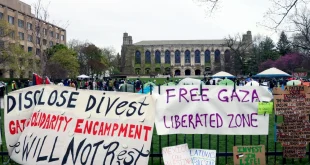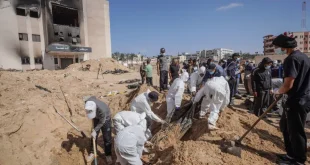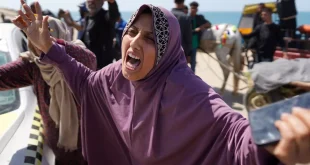Relatives of a victim, died in the Israeli airstrikes, carry a body from the morgue of Nasser Hospital for the funeral ceremony as the Israeli army attacks continue in Khan Yunis, Gaza on November 14, 2023 [Mustafa Hassona – Anadolu Agency]
Israel risks facing a long and bloody insurgency if it defeats Hamas and occupies Gaza without a credible post-war plan to withdraw its troops and move toward the creation of a Palestinian State, US and Arab officials, diplomats and analysts said.
None of the ideas floated so far by Israel, the United States and Arab nations for the post-war administration of Gaza have managed to gain traction, according to two US and four regional officials as well as four diplomats familiar with the discussions, raising fears the Israeli military may become mired in a prolonged security operation.
As Israel tightens its control over northern Gaza, some officials in Washington and Arab capitals fear it is ignoring lessons from the US invasions of Iraq and Afghanistan, when swift military victories were followed by years of violent militancy.
If Gaza’s Hamas-run government is toppled, its infrastructure destroyed and its economy ruined, the radicalisation of an enraged population could fuel an uprising targeting Israeli troops in the enclave’s narrow streets, diplomats and officials say.
VIEW: From Scratch: ‘Greater Israel’
Israel, the US and many Arab states agree that Hamas should be ousted after it launched a cross-border raid on 7 October that killed some 1,200 people and took around 240 hostages. But there is no consensus on what should replace it.
Arab countries and Western allies have said a revitalised Palestinian Authority (PA) – which partially governs the West Bank – is a natural candidate to play a greater role in Gaza, home to some 2.3 million people.
But the credibility of the Authority – run by 87-year-old President Mahmoud Abbas’ Fatah party – has been undermined by its loss of control over Gaza to Hamas in a 2007 conflict, its failure to halt the spread of Israeli settlements in the West Bank and accusations of widespread corruption and incompetence.
Israeli Prime Minister, Benjamin Netanyahu, said at the weekend that the PA in its current form should not take charge of Gaza. He said the Israeli military was the only force capable of eliminating Hamas and ensuring that terrorism did not reappear. In the wake of Netanyahu’s comments, Israeli officials have insisted that Israel does not intend to occupy the Gaza Strip.
Mohammed Dahlan, who was the PA’s security chief for Gaza until it lost control of the Strip to Hamas and has been suggested as a future leader of a post-war government there, said that Israel was mistaken if it believed that tightening its control of Gaza would end the conflict.
Israel is an occupying force and the Palestinian people will deal with it as an occupying force
Dahlan said in his office in Abu Dhabi, where he now lives.
None of the Hamas leadership or fighters will surrender. They will blow themselves up but won’t surrender
Dahlan has the backing of the influential United Arab Emirates to lead a post-war administration in Gaza, according to diplomats and Arab officials. But he said no-one, certainly not him, would want to come in to govern a broken and demolished territory without a clear political path in sight.
“I have not seen any vision from Israel, America or the international community,” Dahlan said, calling for Israel to stop the war and to start serious talks on a two-state solution.
US President, Joe Biden, warned Netanyahu on Wednesday that occupying Gaza would be ‘a big mistake’. So far, the US and its allies have not seen any clear roadmap from Israel for its exit strategy from Gaza, beyond the declared aim of eradicating Hamas, diplomats say. US officials are pressing Israel for realistic objectives and a plan for how to achieve them.
The Israeli government did not respond to requests for comment on its post-war plan in Gaza. Israel’s operation in Gaza – launched in retaliation for the 7 October attack – has so far killed more than 11,000 people and left more than 1 million people homeless, according to the UN and Red Crescent.
While insisting on Israel’s right to defend itself, some US officials are concerned that high civilian casualties could radicalise more Palestinians, driving new fighters into the arms of Hamas or future militant groups that might spring up to replace it, according to a source familiar with US policymaking.
More than a dozen Gazans interviewed by Reuters said the Israeli invasion was spawning a new generation of militants. Abu Mohammad, 37, a public servant from Jabalya refugee camp, said he would rather die than face Israeli occupation.
“I am not Hamas but in days of war, we are all one people, and if they finish off the fighters, we will take up the rifles and fight,” he told Reuters, declining to give his full name for fear of reprisals. “The Israelis may occupy Gaza, but they will never feel secure, not for a day.”
US-led talks
Washington’s discussions of a post-war plan for Gaza are still in the very initial stages with the PA, other Palestinian stakeholders and allies, including Egypt, Jordan, UAE, Saudi Arabia and Qatar, according to two US officials, speaking on the condition of anonymity.
“We’re certainly not there yet in terms of any effort to sell that vision to our regional partners who ultimately will have to live with it, and or implement it,” one senior US official said.
While Biden has insisted the war must end with a “vision” for a two-state solution – which would unify the Gaza Strip and the West Bank into a Palestinian State – he and his senior aides have neither offered specifics on how they expect to achieve this, nor proposed a restart of talks.
Some experts see any effort to revive the negotiations as a long shot, not least because of the embittered mood of Israelis over Hamas’s 7 October atrocities and of Palestinians due to Israel’s retaliation in Gaza.
“Among the many tragedies of Hamas’s terrorist attack is that it fundamentally undermined and set back the Palestinian cause for a sovereign, independent state,” said Jonathan Panikoff, the US government’s former deputy national intelligence officer on the Middle East, who is now at the Atlantic Council think tank.
READ: The humanitarian paradigm and the normalisation of forced transfer
According to a person familiar with the matter, Biden may decide on a more modest initiative that could include outlining a path towards an eventual resumption of negotiations. Biden’s aides recognise that Netanyahu and his far-right coalition, which has rejected the notion of Palestinian statehood, has little appetite for renewed talks.
As Biden seeks re-election next year, he may be reluctant to alienate pro-Israel voters by being seen to pressure Netanyahu for concessions to the Palestinians.
US Secretary of State, Antony Blinken, in a speech last week in Tokyo, explained Washington’s red lines in Gaza, saying the administration was opposed to the forced displacement of Palestinians from the territory, any reduction in its size, its occupation or blockade by Israel. He also said it could not become a platform for terrorism.
Blinken has repeatedly said Washington would like to see a “revitalised” PA ultimately running the Gaza Strip and its governance unified with the West Bank.
Under Abbas – who has run the Authority since 2005 – its credibility has dwindled as the promise of a path to a two-state solution outlined in the 1993 Oslo Peace Accords has ebbed.
That dynamic needs to shift, US officials say. A change of leadership within the PA might be possible, with Abbas remaining perhaps in an honorary role, some diplomats said. Another step under discussion is handing the PA a key role in distributing post-war aid in Gaza to revive its legitimacy, a senior European diplomat said.
Asked about the discussions, a senior PA official said the return of the Authority to Gaza was the only acceptable scenario and that was being discussed with the US and other Western powers. He declined to comment on the proposal that Dahlan or others could lead a Palestinian government.
Some senior Palestinian officials, including Prime Minister, Mohammad Shtayyeh, have said that the Palestinian Authority will not return to power in Gaza on the back of Israeli tanks.
A proposal for a two-year transitional administration of technocrats in Gaza, backed by UN and Arab forces has been floated by Western partners and some Middle Eastern states, diplomats said.
But there has been resistance from key Arab governments – including Egypt – to being drawn into what they regard as the Gaza quagmire, the diplomats said.
Regional powers fear that any Arab forces deployed in Gaza might have to use force against Palestinians and no Arab nation wants its military put in that position.
READ: Karim Khan falls into the mire of politics
No agreement on leadership
While the ageing Abbas is unpopular among many Palestinians, there is no agreement about who might replace him as a future leader.
Dahlan would likely be acceptable to Egypt and Israel but – though he worked closely with the US during his time as Gaza security chief – a US source said that Washington would have some misgivings about him returning to power. He has a long-running enmity with Abbas and the PA’s inner circle, as well as with Hamas supporters.
Dahlan led a wave of arrests and crackdowns against senior Hamas leaders in 1996 after a series of suicide bombings against Israel.
A UAE official said Abu Dhabi would support any post-war arrangements agreed by all parties in the conflict and supported by the United Nations to restore stability and achieve a two-state solution.
Marwan Barghouti, a Fatah leader imprisoned by Israel since 2002 for murder, is popular among many Palestinians, but seen by some in Washington as impractical as the Israeli government would be loathe to release someone they accuse of having “blood on his hands”.
A US official said selecting the leader would be complex, as regional players each have their own favourites and interests at heart. Ultimately, Washington would cast its lot with any leader who gains support from the Palestinian people and its regional allies, as well as Israel.
“Clearly a rejuvenation of Palestinian leadership is desperately needed, but getting there again is a very tricky thing,” said Joost R. Hiltermann, Middle East and North Africa Program Director of the International Crisis Group. He said Arab nations could veto any candidate they disliked and Hamas – which has portrayed itself as the champion of Palestinian independence – would likely win any election.
The stakes are high with the possibility of the conflict spilling over to the Israeli-occupied West Bank, and beyond Israel.
Not since the US invasion of Iraq in 2003 has there been such widespread concern about military action raging across the Middle East, according to Arab officials and diplomats.
Whatever Biden decides to do diplomatically, his aides say he has no interest in the US getting dragged into a direct military role in the conflict, unless America’s own security interests are threatened by Iran or its regional proxies.
“There’s no plans or intentions to put US military troops on the ground in Gaza, now or in the future,” White House National Security spokesperson, John Kirby, told reporters this month.
 Sri lanka Muslims Web Portal Diversity and Inclusiveness
Sri lanka Muslims Web Portal Diversity and Inclusiveness




